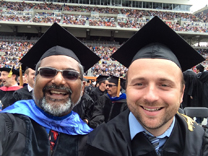|
Are you interested in becoming a VIPER? Here is some information that may be useful to you. Also, don't forget to take a look at the VIPER Brochure!
What does it mean to be part of the VIPER group?
Being a member of VIPER means being part of an intellectual and social community of geologists who share common research interests. As a group we communicate frequently via a mailing list in order to get and share information about our research, career opportunities and geology-related events. We have access to a room in Wilkinson hall which contains textbooks, microscopes, computers and a projector (the VIPER Room). Here the entire group has weekly lunch-time meetings during the term to discuss papers on a wide range of topics (the VIPER Seminar).
Applying to CEOAS
If you are currently considering applying to do an MS or PhD in one of the VIPER specialty areas here are some things to do before applying:
- Look at the VIPER faculty websites and decide which Professor's research interests best match your own. You can find links to faculty websites on the Faculty page.
- Download and read two or three papers written by the Professor you would like to work with. Consider whether you would enjoy writing these sorts of papers and doing the lab or modeling work described in the Methods sections.
- Contact individual Professors for information about their current research projects and funding opportunities. Make sure to include a statement of your research interests and a CV in your emails. Professors often receive quite a lot of mail from prospective students and it is important for them to be able to decide if your research interests match theirs.
- Write your statement of interest for your graduate school application and make sure you mention the names of the Professors you have contacted.
- Contact current students who are working with your potential adviser. What is the work atmosphere like in the Professor's research group? Are the students making steady progress towards completion of their degrees? Are they satisfied with the amount of support they are getting from their adviser?
VIPER members usually pursue degrees in two different programs at CEOAS:
- Geology: Those with an interest in traditional field geology can apply to the Geology program. This program puts a greater emphasis on field mapping and traditional hard-rock geology. Students under this program also tend to be more involved in undergraduate teaching since there is a Geology undergraduate major (Oceanography is primarily a graduate discipline). The degree granted will be a PhD/MS in Geology with a concentration in Volcanology, Igneous petrology or Economic geology.
- Marine Geology: Those with a specific interest in the marine environment can apply to the Oceanography program. This program requires classes in physical, chemical, biological and geological oceanography, including igneous and sedimentary processes. The degree granted will be a PhD/MS in Ocean, Earth and Atmospheric Sciences with a concentration in Geological Oceanography.
You should consult your potential adviser about which program will best fit your needs. An application to the graduate school can be made through the CEOAS website.
|

